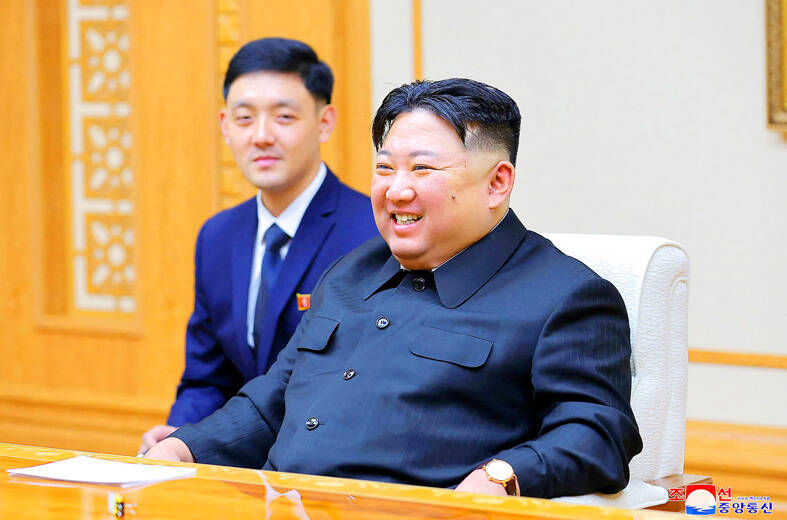North Korea is poised to close as many as a dozen embassies, including in Spain, Hong Kong and multiple countries in Africa, to media reports and analysts said, in a move that could see nearly 25 percent of Pyongyang’s missions close worldwide.
North Korea’s recent closing of its diplomatic missions was a sign that the reclusive country is struggling to make money overseas because of international sanctions, the South Korean Ministry of Unification said on Tuesday.
On Monday, North Korean state media outlet Korean Central News Agency said the country’s ambassadors paid “farewell” visits to Angolan and Ugandan leaders last week, and local media in both African countries reported the shutdown of the North’s embassies there.

Photo: AFP / Korean Central News Agency via KNS
Angola and Uganda have forged friendly ties with North Korea since the 1970s, maintaining military cooperation and providing rare sources of foreign currency such as statue-building projects.
The embassy closings set the stage for what could be “one of the country’s biggest foreign policy shake-ups in decades,” with implications for diplomatic engagement, humanitarian work in the isolated country, as well as the ability to generate illicit revenue, wrote Chad O’Carroll, founder of the North Korea-focused Web site NK Pro.
More than a dozen missions might close, likely because of international sanctions, a trend of Pyongyang’s disengaging globally and the probable weakening of the North Korean economy, he said in a report yesterday.
Seoul’s unification ministry, which handles inter-Korean affairs, said the pullout reflected the effects of international sanctions aimed at curbing funding for the North’s nuclear and missile programs.
“They appear to be withdrawing as their foreign currency earning business has stumbled due to the international community’s strengthening of sanctions, making it difficult to maintain the embassies any longer,” the ministry said in a statement. “This can be a sign of North Korea’s difficult economic situation, where it is difficult to maintain even minimal diplomatic relations with traditionally friendly countries.”
North Korea has formal relations with 159 countries, but had 53 diplomatic missions overseas, including three consulates and three representative offices, until it pulled out of Angola and Uganda, the ministry said.
North Korea is also to shut down its embassy in Spain, with its mission in Italy handling affairs in the neighboring country, South Korea’s Yonhap News Agency reported.
In a letter posted on the Spanish Communist Party’s Web site, the North Korean embassy announced the closing on Thursday last week.
North Korea’s embassy in Madrid was in the spotlight after members of a group seeking the overthrow of North Korean leader Kim Jong-un staged a break-in in 2019, during which they bound and gagged staff before driving off with computers and other devices.
Pyongyang denounced the incident as a “grave breach of sovereignty and terrorist attack,” and accused the US of not investigating the group thoroughly and refusing to extradite its leader.

Kehinde Sanni spends his days smoothing out dents and repainting scratched bumpers in a modest autobody shop in Lagos. He has never left Nigeria, yet he speaks glowingly of Burkina Faso military leader Ibrahim Traore. “Nigeria needs someone like Ibrahim Traore of Burkina Faso. He is doing well for his country,” Sanni said. His admiration is shaped by a steady stream of viral videos, memes and social media posts — many misleading or outright false — portraying Traore as a fearless reformer who defied Western powers and reclaimed his country’s dignity. The Burkinabe strongman swept into power following a coup in September 2022

‘FRAGMENTING’: British politics have for a long time been dominated by the Labor Party and the Tories, but polls suggest that Reform now poses a significant challenge Hard-right upstarts Reform UK snatched a parliamentary seat from British Prime Minister Keir Starmer’s Labor Party yesterday in local elections that dealt a blow to the UK’s two establishment parties. Reform, led by anti-immigrant firebrand Nigel Farage, won the by-election in Runcorn and Helsby in northwest England by just six votes, as it picked up gains in other localities, including one mayoralty. The group’s strong showing continues momentum it built up at last year’s general election and appears to confirm a trend that the UK is entering an era of multi-party politics. “For the movement, for the party it’s a very, very big

ENTERTAINMENT: Rio officials have a history of organizing massive concerts on Copacabana Beach, with Madonna’s show drawing about 1.6 million fans last year Lady Gaga on Saturday night gave a free concert in front of 2 million fans who poured onto Copacabana Beach in Rio de Janeiro for the biggest show of her career. “Tonight, we’re making history... Thank you for making history with me,” Lady Gaga told a screaming crowd. The Mother Monster, as she is known, started the show at about 10:10pm local time with her 2011 song Bloody Mary. Cries of joy rose from the tightly packed fans who sang and danced shoulder-to-shoulder on the vast stretch of sand. Concert organizers said 2.1 million people attended the show. Lady Gaga

SUPPORT: The Australian prime minister promised to back Kyiv against Russia’s invasion, saying: ‘That’s my government’s position. It was yesterday. It still is’ Left-leaning Australian Prime Minister Anthony Albanese yesterday basked in his landslide election win, promising a “disciplined, orderly” government to confront cost-of-living pain and tariff turmoil. People clapped as the 62-year-old and his fiancee, Jodie Haydon, who visited his old inner Sydney haunt, Cafe Italia, surrounded by a crowd of jostling photographers and journalists. Albanese’s Labor Party is on course to win at least 83 seats in the 150-member parliament, partial results showed. Opposition leader Peter Dutton’s conservative Liberal-National coalition had just 38 seats, and other parties 12. Another 17 seats were still in doubt. “We will be a disciplined, orderly